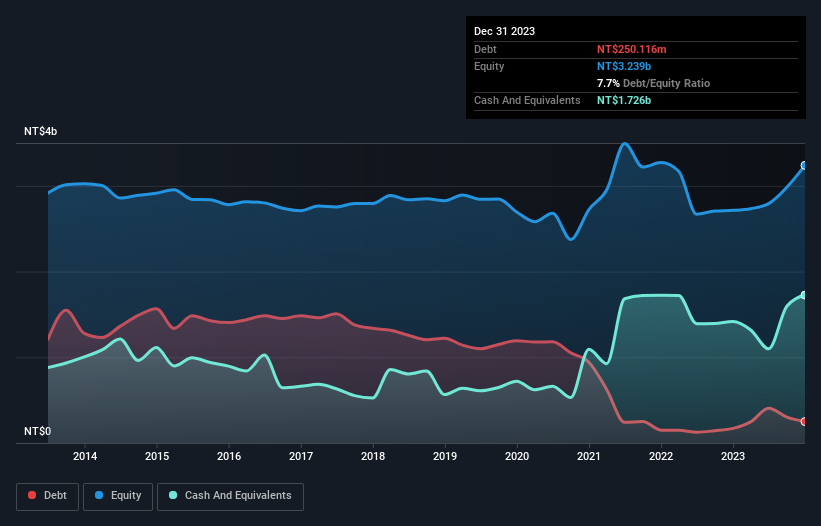
Legendary fund manager Li Lu (who Charlie Munger backed) once said, 'The biggest investment risk is not the volatility of prices, but whether you will suffer a permanent loss of capital.' So it seems the smart money knows that debt - which is usually involved in bankruptcies - is a very important factor, when you assess how risky a company is. Importantly, Tze Shin International Co., Ltd. (TWSE:2611) does carry debt. But the more important question is: how much risk is that debt creating?
Why Does Debt Bring Risk?
Debt is a tool to help businesses grow, but if a business is incapable of paying off its lenders, then it exists at their mercy. In the worst case scenario, a company can go bankrupt if it cannot pay its creditors. However, a more common (but still painful) scenario is that it has to raise new equity capital at a low price, thus permanently diluting shareholders. Having said that, the most common situation is where a company manages its debt reasonably well - and to its own advantage. The first thing to do when considering how much debt a business uses is to look at its cash and debt together.
Check out our latest analysis for Tze Shin International
What Is Tze Shin International's Net Debt?
You can click the graphic below for the historical numbers, but it shows that as of December 2023 Tze Shin International had NT$250.1m of debt, an increase on NT$170.8m, over one year. But it also has NT$1.73b in cash to offset that, meaning it has NT$1.48b net cash.

How Healthy Is Tze Shin International's Balance Sheet?
According to the last reported balance sheet, Tze Shin International had liabilities of NT$401.5m due within 12 months, and liabilities of NT$559.0m due beyond 12 months. On the other hand, it had cash of NT$1.73b and NT$217.6m worth of receivables due within a year. So it can boast NT$983.2m more liquid assets than total liabilities.
It's good to see that Tze Shin International has plenty of liquidity on its balance sheet, suggesting conservative management of liabilities. Because it has plenty of assets, it is unlikely to have trouble with its lenders. Succinctly put, Tze Shin International boasts net cash, so it's fair to say it does not have a heavy debt load! When analysing debt levels, the balance sheet is the obvious place to start. But you can't view debt in total isolation; since Tze Shin International will need earnings to service that debt. So when considering debt, it's definitely worth looking at the earnings trend. Click here for an interactive snapshot.
In the last year Tze Shin International had a loss before interest and tax, and actually shrunk its revenue by 15%, to NT$617m. We would much prefer see growth.
So How Risky Is Tze Shin International?
Although Tze Shin International had an earnings before interest and tax (EBIT) loss over the last twelve months, it made a statutory profit of NT$468m. So taking that on face value, and considering the cash, we don't think its very risky in the near term. With mediocre revenue growth in the last year, we're don't find the investment opportunity particularly compelling. There's no doubt that we learn most about debt from the balance sheet. But ultimately, every company can contain risks that exist outside of the balance sheet. We've identified 2 warning signs with Tze Shin International , and understanding them should be part of your investment process.
If you're interested in investing in businesses that can grow profits without the burden of debt, then check out this free list of growing businesses that have net cash on the balance sheet.
Valuation is complex, but we're here to simplify it.
Discover if Tze Shin International might be undervalued or overvalued with our detailed analysis, featuring fair value estimates, potential risks, dividends, insider trades, and its financial condition.
Access Free AnalysisHave feedback on this article? Concerned about the content? Get in touch with us directly. Alternatively, email editorial-team (at) simplywallst.com.
This article by Simply Wall St is general in nature. We provide commentary based on historical data and analyst forecasts only using an unbiased methodology and our articles are not intended to be financial advice. It does not constitute a recommendation to buy or sell any stock, and does not take account of your objectives, or your financial situation. We aim to bring you long-term focused analysis driven by fundamental data. Note that our analysis may not factor in the latest price-sensitive company announcements or qualitative material. Simply Wall St has no position in any stocks mentioned.
About TWSE:2611
Tze Shin International
Primarily provides transportation services in Taiwan.
Good value with proven track record and pays a dividend.
Market Insights
Community Narratives




